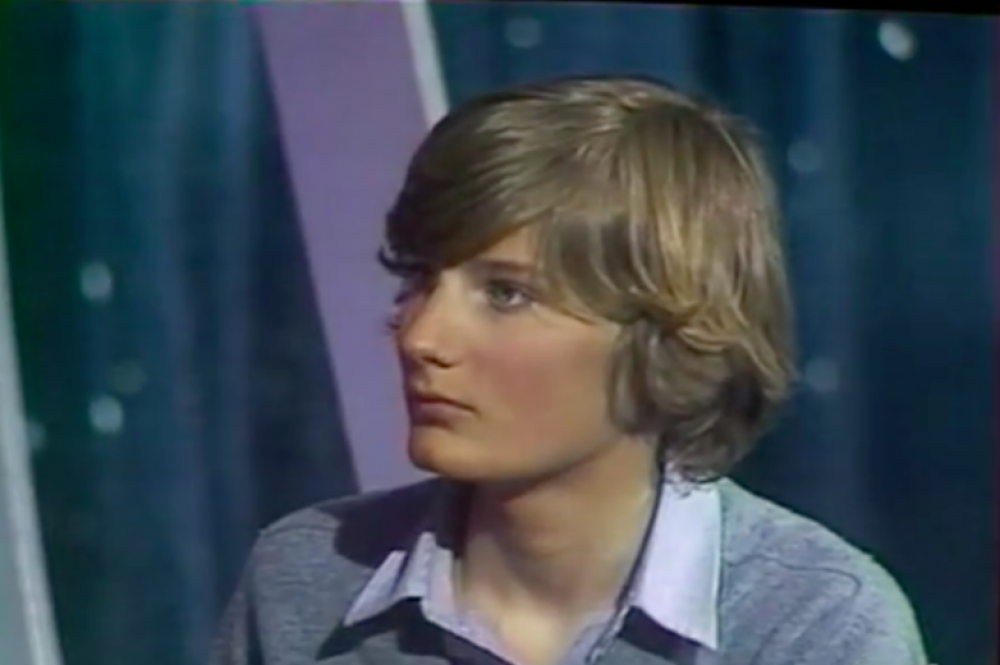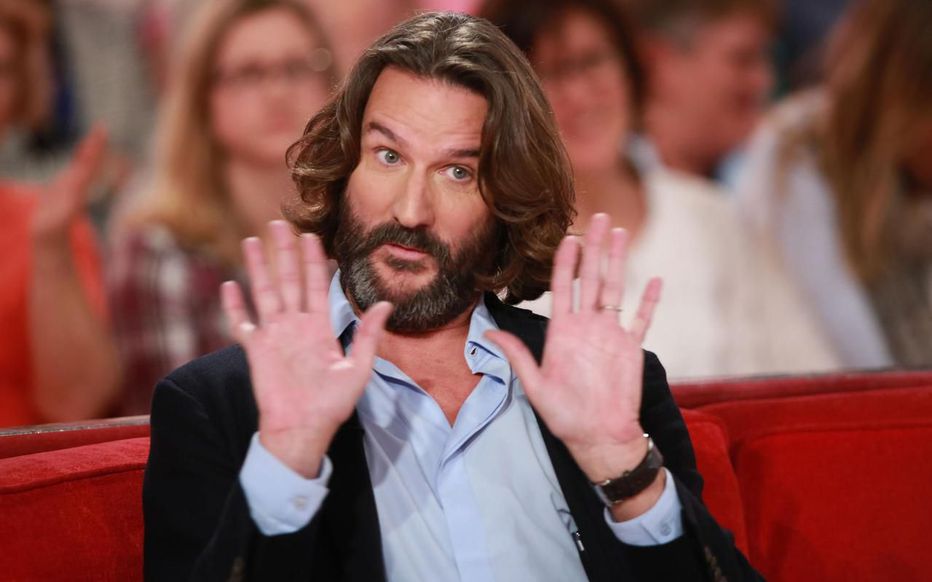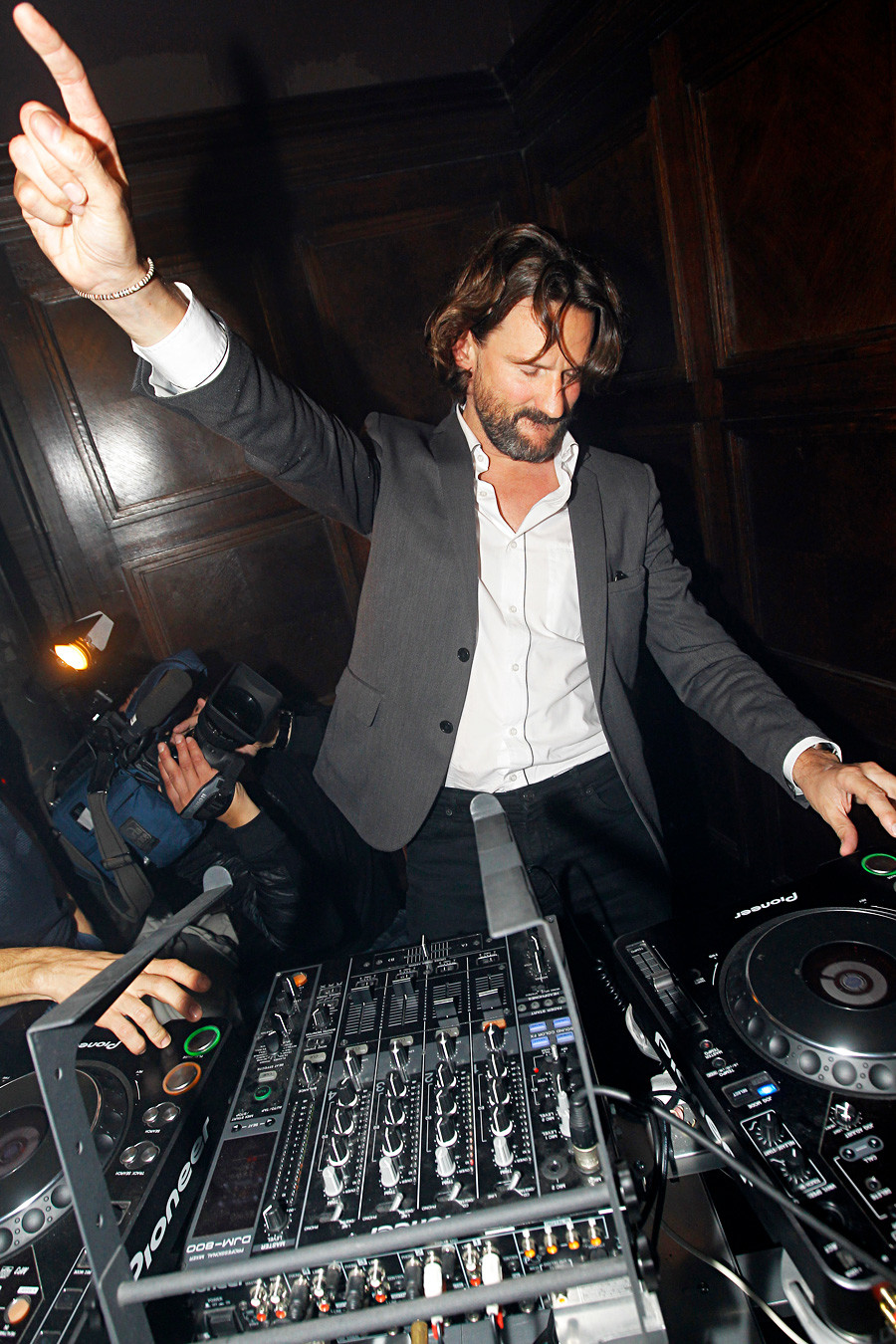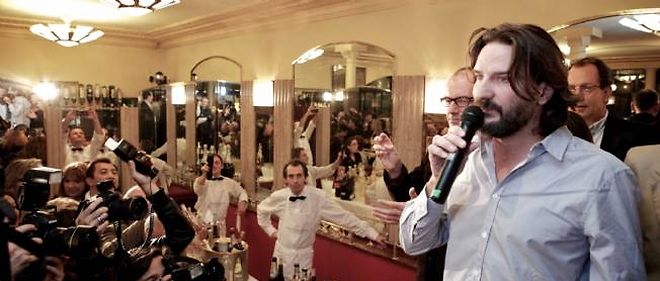

French writer, literary critic and film producer, Frederic Beigbeder is known for his provocative stance, extravagant parties and fondness of beauty. In 2004, he created le Prix de Flore, a literary price whose laureate receives 6000 euro and the right to drink every day, for a year, a glass of Pouilly-Fumé in the legendary Café de Flore in Paris. Though he shares affinities with dandyism he remains concerned and involved with political and environmental issues. Difficult to classify, belonging everywhere and nowhere, he is for sure an agent provocateur, who takes pleasure in saying what others don’t dare to think. “If I’m told that Polanski is evil and a rapist, it makes me want to see all his movies. I’m like a little boy seeking to disobey.” In search of off the beaten track opinions, I often google the name of Frédéric Beigbeder. He is for instance one of the only literary critic who dares to denounce the moralistic and politically correct opinions of Annie Ernaux, unassailable and ultra-respected French writer. Previously working in advertisement Fréderic Beigbeder excels in creating tropes. He summarizes situations with strong images and disturbing truths. “A trial is daily held by the young generation on the old. 2020 judges 1970. We are heading straight towards a racism of the old. It’s actually the only discrimination which is truly authorized and even supported by the media." Today 54, Frédéric Beigbeder shares his time between Paris and the Basque Atlantic coast where he lives with his family and children. My aim was to meet him during his last stay in Switzerland but with the coronavirus and other unexpected events, we ended up speaking on the phone on a gloomy Monday morning. He was sitting in the living room of his mother in law’s house situated near Geneva while I was hidden in the attic of my parents in law in Erfurt. Yet we managed to make sense of a few important points, some of which have been previously published in Heidi.news
***
When and why did you start writing?
When my parents divorced, my father brought us, my brother and I, on holiday to Bali, in Indonesia. It was very rare at the time, in the early seventies, to travel so far with two children. I was approximatively 7 and I don’t know why I started taking notes. I had this little green school book, in which I’d inscribe everyday what had happened to us. We for instance attended an incineration, where everyone was dressed in white while the corpses were burning. We had also been shaken by an earthquake. Since this trip, I never stopped taking notes. I’m incapable of inventing a story but describing what happens to me is something I continue doing today. Now, after having undergone years of psychoanalysis, I realize that my desire to write is most probably born from an attempt to retain my father from leaving us. To make our moments together last. I’d never take notes with my mother, fact which still offends her a little today.
Mothers used as trashcans
We give them no recognition. No, it’s not true. My brother and I have immense gratitude towards my mother who educated us while working and gave us everything we ever needed. It’s was mainly because my father had disappeared and had become so rare that I’d try to transform the ephemeral moment spent in his company into something eternal. Whereas with my mother, I lived with her, saw her everyday so there was no point indeed! (Laughter)
 December 2019, France Inter © Frédéric Dugit
December 2019, France Inter © Frédéric Dugit
Do you have any writing habits, schedules, guidelines?
There are two types of writers: the ones who await to be visited by the muses and the organized and disciplined ones, who write every day on an hourly basis. Tolstoy for example, belonged to the latter. He would start writing every morning at 4am. Amélie Nothomb does the same today. I think I’m slowly heading from the first to the second type of writers, but let’s say it’s a long journey. Most of my books have been written while believing in the existence of inspiration, thus accepting that there were days with and days without. Since I now have two small children, relying on inspiration became complicated. I in fact have no other choice than to be disciplined and use my free time cleverly. That’s also the reason why I built myself a hut in my garden. As soon as my children have their nap, I lock myself up and force myself to be productive.Interestingly so, I’m realizing that I was mistaken with this romantic idea of the inspired writer whose hair blows in the wind. Tolstoy is the one who is right. One needs to be laborious, hardworking and oblige oneself every day to be alone in front of a blank page. Why? because in the end something still comes out and it isn’t necessarily worse than what’s produced, wasted at 3am in a night-club. Of course, on the spot I have the impression of having done something very simple and unextraordinary, but when I reread myself, I see that it’s not that bad. I’d even say that this normality, this boring and non-photogenic way of writing is in some aspects more interesting. And it was after all my original way of writing. When I was seven in Indonesia, I’d only write once I was back in my room. So I had a frame. I guess I’m now aiming to go back to this method.
Do you have any blockages or things which prevent you from writing?
As with most lazy people, I procrastinate a lot. I find excuses not to work, watch stupid videos on internet, check five times my fridge to see what’s to eat or drink. Other than this, not really no.
Do you write on a computer?
I use both methods. I always carry a pen and a note pad with me on which I inscribe my ideas. So when I’m in front of my computer, my hands are never really empty. For instance, I wrote one evening on my notepad “My name is Octave and I’ll be 74 years old in 20 years.” I later used this terrifying sentence as the starting point of my previous novel. These words helped me develop further ideas.
So you write without any pre-elaborated structure?
I hope it doesn’t show too much!
It for sure works
In my last book I decided to divide the plot into twelve hours. Twelve hours in which I could plug in whatever I wanted. The only requirement was to change hour from time to time. This structure enabled me to insert notes I had been taken for over a year.
Do you write very fast?
I took approximatively one year to write my last book. Jean d’Ormesson had once told me that by writing everyday one page, one arrives at a 365 page book in a year which is enormous. I actually suspect he drastically reduced his writing towards the end, as his last books had become finer and finer. Maybe he ended up only writing one paragraph a day, who knows. Yet with 8 to 15 lines a day, which for some only takes 5 minutes, you still end up with a 200 page book per year, which is a lot.
You aren’t the flaubertian type who rereads and rewrites sentences for weeks?
Oh I’m crazy about proof-reading, but one also needs to move forward. Rereading and correcting can easily become an excuse to not produce. In my case, I wait to have sufficient material to… It’s a little bit like when you make pancakes. One needs to let the dough rest for a while. This comparison is pathetic. Though Colette would often compare writing to cooking, so I can live with it. The advantage of moving forward when writing is that what seems to be shit on the spot is left to rest in a drawer for let’s say two months and then when you reread it you are often pleasantly surprised. You immediately see where there are repetitions, which passages are boring and banal and you can easily get rid of them.
Though you regularly depreciate yourself you seem to never reach a bottom which would prevent you from expressing yourself. What’s your recipe?
I enjoy enormously authors who bash themselves like Charles Bukowski, Francois Nourrissier or Emil Cioran’s pessimism, all of by whom I’ve all been influenced. Yet like every writer, I’m immensely pretentious. Doing this job implies you to be, to some extent, megalomaniac. There is a phrase from Talleyrand which I particularly cherish. “Quand je me regarde, je me désole. Quand je me compare, je me console. » Afflicted when observing myself, consoled when comparing myself. Something which keeps me ambitious is reading everything that comes out. When I read great stuff, I feel of course smashed and depressed for about or week or so, but I also regularly come across things which make me believe I can do better.
Which authors have greatly influenced your work?
There are so many. Salinger, John Fante, Charles Bukowski, Scott Fitzgerald and in French literature, Françoise Sagan, Boris Vian, Antoine Blondin, Frédéric Dard, Colette of course, for her short phrases. Did you notice I didn’t mention Marcel Proust?
Are you against?
Non. I’m hugely admirative, but incapable of writing anything close to his style.
 Moscow, © Iliya Pitalev/Sputnik in Russia Beyond (09.19)
Moscow, © Iliya Pitalev/Sputnik in Russia Beyond (09.19)
You are famous for your sleepless nights out. What attracts you into partying?
This impression that one is freer, above oneself, unveiled. As if during the day we’d wear masks which we could finally put aside at the fall of the night. It might well be that truth is elsewhere, that we lie to ourselves at night and become more authentic and genuine during the day. My attraction for nightlife and partying comes from far. I was 13 when my parents brought me for the first time to a nightclub. It was Chez Castel in Paris. I remember being dazzled by the beauty of all these women wearing evening gowns, earrings, lipstick and who smelled so good. The men were in suits, telling jokes and laughing. They were most probably tipsy, but what I remember is people in a good mood. The dim light made them seem more beautiful and brilliant. This atmosphere, appeared to me as magical. As a Disneyland for adults. I guess that’s how I fell into the trap!
In your last book, L’homme qui pleure de rire, you describe the effects of ketamine on your protagonist. Is it a substance which you enjoy ?
Not really no. I did add a lot for the pleasure of fiction and also because to my knowledge there hasn’t been a novel written on ketamine yet. Drugs interest me in the sense that they often symbolize the spirit of an era. In the 1980’s , it was cocaine. One needed to be a winner, megalomaniac, paranoiac and dynamic. The 1990-2000 were more suited more to MDMA. These were the post-aid years, where we’d act as if we were in love while arriving at nothing. MDMA is the drug of love without sex. Ketamine, which drives to a dissociation between the mind and the body is a misanthropic and autistic drogue. One imagines stuff while remaining seated on one’s chair. It’s a substance which in fact corresponds quite well to the title of my last book, this petrifying and most used emoticon in the world of this man laughing to tears.
 Prix de Flore, Paris 2012 © SIPA
Prix de Flore, Paris 2012 © SIPA
You have a nice way of recognizing your guilt towards the environmental crisis, which scandalized the young generation. Simultaneously, you seem to regret the days where it was possible to live in a free-spirited and absurd manner.
My generation was the one of irony. We would joke all day long about everything doing absolutely nothing to prevent the destruction of our environment. We would even nihilistically endorse what was going on. Our parents, my parents, so to say the baby-boomer, and then my generation, the ones born in the 1960’s only thought of laughing, consuming, burning oil and producing plastic. Today we have 15-20 years old people who realize that they have been handed a polluted nature, an ocean filled with plastic bottles and an unbreathable air all this because of our life style. It may be that there will be solutions like with the coronavirus which will kill billions of people in order for others to be able to breathe again but in the meantime, one needs to be blamed. In my defense, in my novel 99Fr which was published 20 years ago, my protagonist said exactly what Greta says today. I had warned the world that endless growth would not be sustainable on a planet with limited resources. I just want to make this clear. Who knows, these words may save my life the day all boomers will be beheaded.
If you could reincarnate and choose the era, the country, the profession, personality, legend, anything. What would you choose?
I’d be tempted to say Charles Baudelaire though his life mustn’t have been very funny. Or Alfred Musset..No I know. John Lennon. A young guy from Liverpool who did some rock in a basement with three friends and who became the biggest rock composer of history. On top, he died young. Murdered in the street, problem quickly and painlessly resolved.
Let’s say you are a philanthropic billionaire and you are obliged to give away some of your money, to which cause would you give?
Maybe the Gates foundation? Yes, I’d give my money to the richest man on the planet (laughter).
***